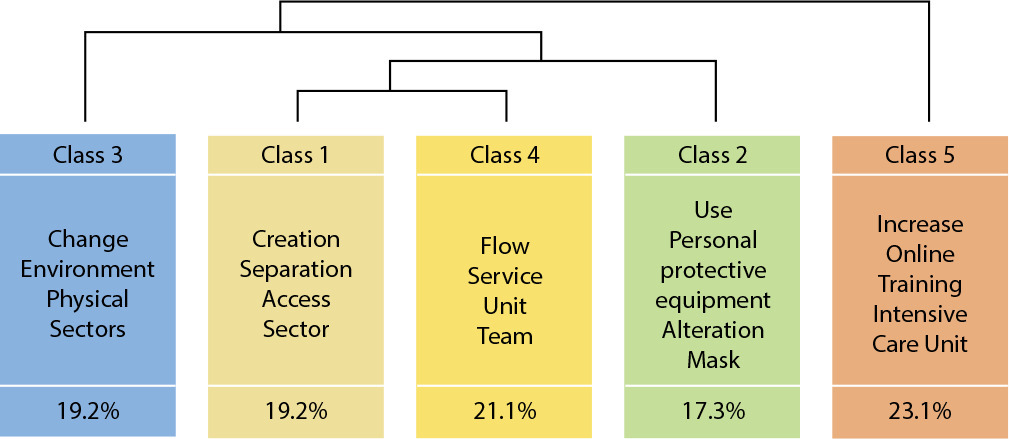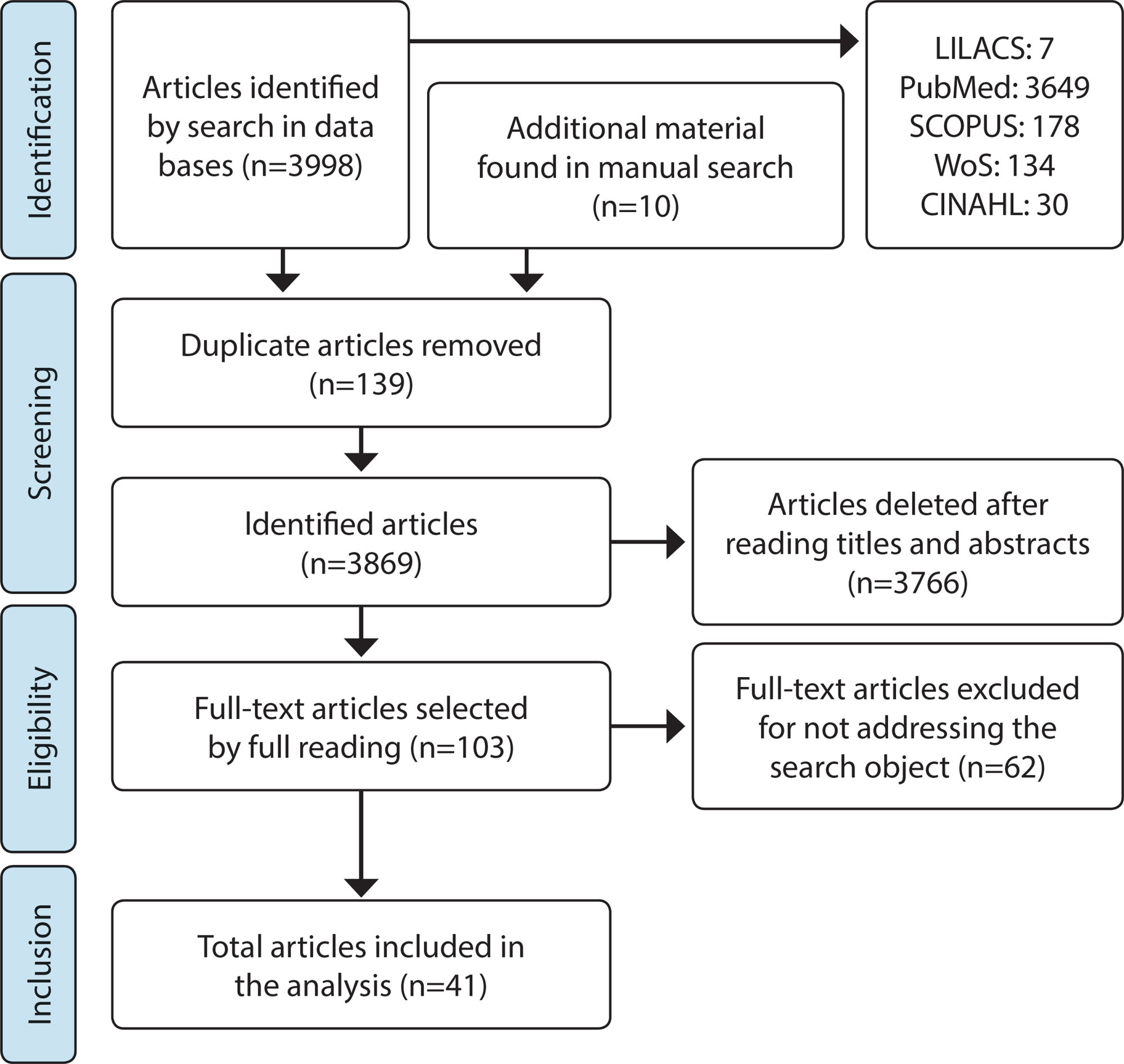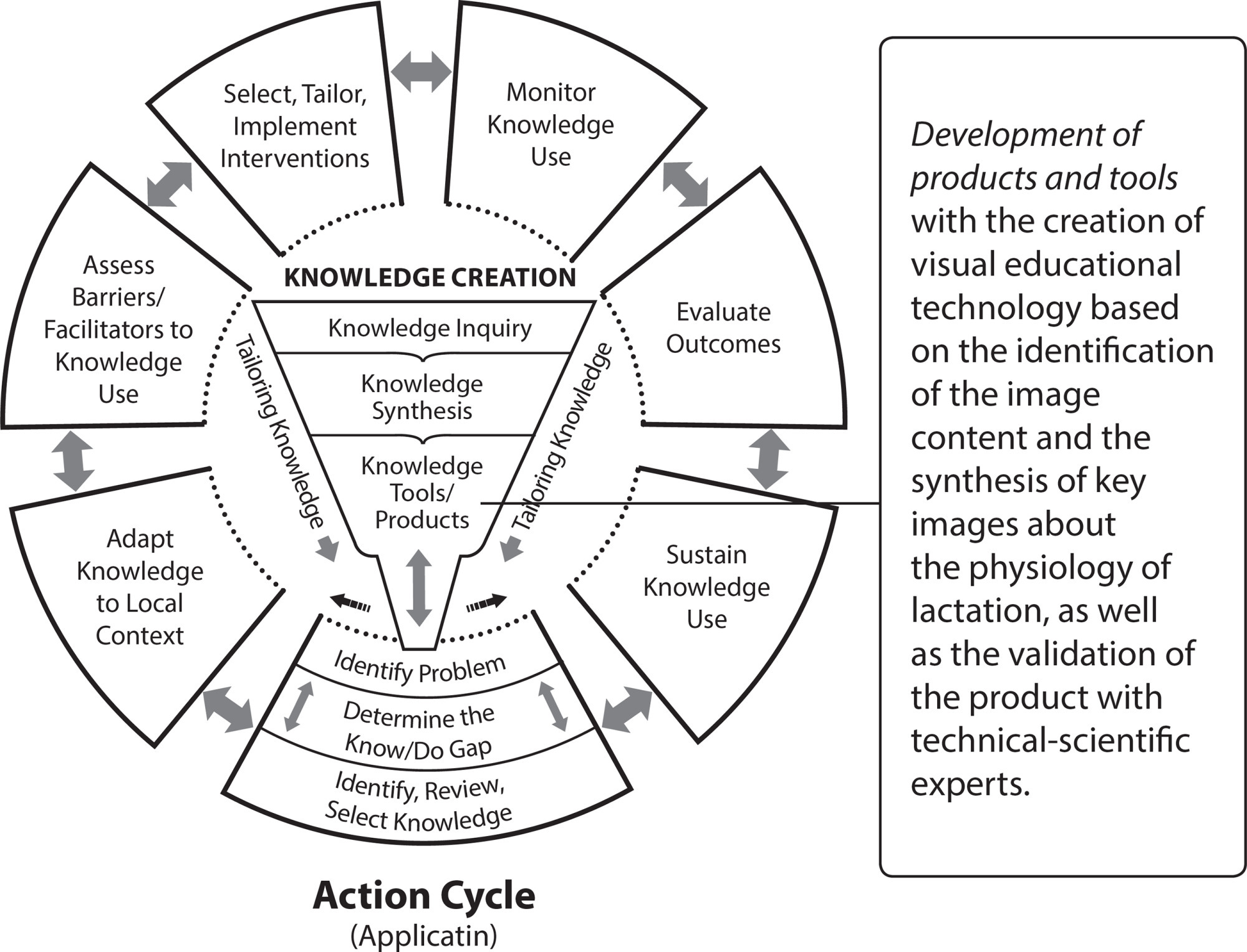-
REVIEW
Telenursing in the postoperative period: a scoping review
Revista Brasileira de Enfermagem. 2024;77(3):e20240066
07-29-2024
Abstract
REVIEWTelenursing in the postoperative period: a scoping review
Revista Brasileira de Enfermagem. 2024;77(3):e20240066
07-29-2024DOI 10.1590/0034-7167-2024-0066
Views0See moreABSTRACT
Objectives:
to map available evidence on telenursing use in the postoperative period and its impact on patient outcomes.
Methods:
a scoping review, conducted according to the JBI model and the PRISMA-ScR checklist. The search was carried out in the CINAHL, Embase, LILACS, PubMed, Web of Science, SciELO, Scopus and Cochrane Library databases.
Results:
twelve studies were included, published between 2011 and 2023, 66.6% of which were in developed countries. Of the positive outcomes, we highlight improved levels of disability, autonomy and quality of life, lower rates of post-operative complications, pain and reduced costs. Telephone monitoring was the most widely used modality, but there were few studies in the pediatric context and in Brazil.
Conclusions:
of the studies, 11 (91.6%) identified at least one positive outcome in telenursing use and none showed negative aspects in the postoperative period. The role of nurses in digital health needs further study.

-
REVIEW
Nursing care for hospitalized older adults – fall accidents versus safe mobility: a scoping review
Revista Brasileira de Enfermagem. 2024;77(2):e20230180
07-19-2024
Abstract
REVIEWNursing care for hospitalized older adults – fall accidents versus safe mobility: a scoping review
Revista Brasileira de Enfermagem. 2024;77(2):e20230180
07-19-2024DOI 10.1590/0034-7167-2023-0180
Views0See moreABSTRACT
Objectives:
to map the constituent elements of the safe mobility concept present in hospital care for older adults.
Methods:
a scoping review of 35 articles searched in databases and gray literature – BDENF/VHL, Scopus, CINAHL/EBSCO, Embase, Web of Science, PEDro, MEDLINE/PubMed and CAPES Theses and Dissertations Catalog. No time or language cut-off was established.
Results:
none of the studies presented a clear safe mobility concept, however its constituent elements involve factors related to patient (behavioral factors, conditions, diseases, signs and symptoms, nutritional status, age, balance, strength, gait quality, sleep), the institution (environment, treatment devices, guidelines, medications and polypharmacy, material and human resources and clothing/shoes) and the nature of the interventions (related to the patient, institution and family).
Final Considerations:
the constituent elements of safe mobility express hospital units’ capacity to guarantee care and protection from fall accidents for hospitalized older adults.

-
REVIEW
Drug-resistant tuberculosis: integrative review of nursing care in primary health care
Revista Brasileira de Enfermagem. 2024;77(2):e20230097
07-19-2024
Abstract
REVIEWDrug-resistant tuberculosis: integrative review of nursing care in primary health care
Revista Brasileira de Enfermagem. 2024;77(2):e20230097
07-19-2024DOI 10.1590/0034-7167-2023-0097
Views0See moreABSTRACT
Objectives:
to identify, in the scientific literature, the care that should be provided to individuals with drug-resistant tuberculosis by nurses in primary health care.
Methods:
integrative review, using the Preferred Reporting Items for Systematic Reviews and Meta-Analyses study selection flowchart. Data collection was conducted in November 2022, across ten databases.
Results:
six studies emphasized that nurses should perform directly observed treatment; two highlighted the importance of integrated care management between tuberculosis and human immunodeficiency virus; two demonstrated comprehensive nursing consultation using the nursing process; one emphasized person-centered care, with discharge planning and improved hospital communication with primary health care services.
Final Considerations:
the care that nurses should provide to individuals with drug-resistant tuberculosis in primary health care, for care resolution, is evidence-based.

-
ORIGINAL ARTICLE
Translation and cross-cultural adaptation of the MISSCARE Survey-Ped into Brazilian Portuguese
Revista Brasileira de Enfermagem. 2024;77(2):e20230060
07-19-2024
Abstract
ORIGINAL ARTICLETranslation and cross-cultural adaptation of the MISSCARE Survey-Ped into Brazilian Portuguese
Revista Brasileira de Enfermagem. 2024;77(2):e20230060
07-19-2024DOI 10.1590/0034-7167-2023-0060
Views0See moreABSTRACT
Objectives:
to translate and cross-culturally adapt the MISSCARE Survey-Ped for use in Brazil.
Methods:
a methodological study proposed by translation, synthesis of translations, back-translation, assessment by a committee of experts and pre-testing with the target population.
Results:
two direct translations of the instrument were carried out, followed by a consensual version between them. This synthetic version was back-translated and analyzed by a committee of five experts in pediatric nursing and patient safety, obtaining a Content Validity Index (CVI) of 0.95 and Cronbach’s alpha of 0.804. The final version was sent for pre-testing with 254 Brazilian pediatric nurses, with 44 (17.3%) analyzing the instrument for understanding (CVI 0.866; Content Validity Ratio (CVR) 0.773), relevance (CVI 0.931; CVR 0.864) and relevance (CVI 0.977; CVR 0.955).
Conclusions:
the MISSCARE Survey-Ped Brasil was considered suitable for application in pediatric nurses’ clinical practice in the country.
-
ORIGINAL ARTICLE
Nursing students’ perception: Escape Room use in teaching leadership skills
Revista Brasileira de Enfermagem. 2024;77(2):e20230414
07-19-2024
Abstract
ORIGINAL ARTICLENursing students’ perception: Escape Room use in teaching leadership skills
Revista Brasileira de Enfermagem. 2024;77(2):e20230414
07-19-2024DOI 10.1590/0034-7167-2023-0414
Views0See moreABSTRACT
Objectives:
to understand nursing students’ perception regarding Escape Room use to develop leadership skills.
Methods:
a qualitative exploratory-descriptive study, with 97 nursing students. Escape Room game sessions were held, totaling ten. Subsequently, a debriefing and analysis was carried out using the Discourse of the Collective Subject method, through the focus group technique. Ethical procedures were respected.
Results:
students’ perceptions about using this methodology to develop leadership skills were positive and significant. The effectiveness of the game in teaching and developing these skills in nursing practice stands out.
Final Considerations:
the game was an effective active methodology in approaching the proposed content, promoting satisfaction and easy assimilation.
-
ORIGINAL ARTICLE
Validation of the Brazilian Version of the Modified Scale for Delineating Advanced Practice Nursing Roles
Revista Brasileira de Enfermagem. 2024;77(2):e20230211
07-19-2024
Abstract
ORIGINAL ARTICLEValidation of the Brazilian Version of the Modified Scale for Delineating Advanced Practice Nursing Roles
Revista Brasileira de Enfermagem. 2024;77(2):e20230211
07-19-2024DOI 10.1590/0034-7167-2023-0211
Views0See moreABSTRACT
Objectives:
to validate the Brazilian version of the Modified Scale for Delineating Advanced Practice Nursing Roles.
Methods:
this was a methodological study for the clinical validation of an instrument, conducted with 207 nurses working in primary care. Exploratory and confirmatory factor analysis, Cronbach’s alpha test, and z-test for proportion comparison were used.
Results:
the internal reliability of the scale was 0.944, with alpha greater than 0.80 in most domains, except for Education (0.786). In the exploratory factor analysis, considering the criterion of eigenvalue greater than one, eight factors were identified, explaining 79.38% of the variance. In the comparison of proportions, the adequate responses (≥ 2) in the domain of Comprehensive Direct Care, in both analyzed groups, were statistically equal. This domain had the highest score of adequate responses, followed by Education and Systems Support. Insufficient scoring was observed in the domains of Publication and Professional Leadership.
Conclusions:
the instrument demonstrated stability and reliability to be used in the evaluation of advanced nursing practice.

-
ORIGINAL ARTICLE
The use of spirituality/religiosity by oncology nurse residents in nursing care
Revista Brasileira de Enfermagem. 2024;77(2):e20230383
07-19-2024
Abstract
ORIGINAL ARTICLEThe use of spirituality/religiosity by oncology nurse residents in nursing care
Revista Brasileira de Enfermagem. 2024;77(2):e20230383
07-19-2024DOI 10.1590/0034-7167-2023-0383
Views0See moreABSTRACT
Objectives:
to analyze the use of spirituality/religiosity by oncology nurse residents in caring for patients with cancer.
Methods:
a census, descriptive, sectional study, with 46 nurse residents from three public hospitals in Rio de Janeiro. Data collection took place between August 2020 and January 2021, using a sociodemographic questionnaire, including a question about the use of spirituality/ religiosity to deal with work situations. Descriptive analysis was carried out using SPSS software version 22.0.
Results:
participants stated that they use religiosity/spirituality in work situations related to patients or themselves. In relation to patients, death was the most mentioned situation among professionals, and for themselves, everyday situations and emotional vulnerability were the most mentioned.
Final Considerations:
spirituality and religiosity are dimensions that guide oncology nurse residents’ attitudes.
-
ORIGINAL ARTICLE
Validation of an instrument for assessing leprosy care in children and adolescents
Revista Brasileira de Enfermagem. 2024;77(2):e20230344
07-19-2024
Abstract
ORIGINAL ARTICLEValidation of an instrument for assessing leprosy care in children and adolescents
Revista Brasileira de Enfermagem. 2024;77(2):e20230344
07-19-2024DOI 10.1590/0034-7167-2023-0344
Views0See moreABSTRACT
Objectives:
to validate the content of an instrument for assessing leprosy care in individuals under 15 years old in the context of Primary Health Care.
Methods:
methodological study of content validation, based on the evaluation of essential and derived attributes in primary care, in the professional version. For data analysis, the Content Validation Index (CVI ≥ 0.8) and Cronbach’s Alpha were calculated.
Results:
a higher percentage of judges among nurses (61.5%) was observed; with a doctorate (46.2%), and engaged in teaching and research (77%). The overall Content Validation Index of the instrument was 0.98. In the analysis of Cronbach’s Alpha of the instrument, the assigned value was 0.717.
Conclusions:
the instrument represents an advancement in the measurement of health evaluation policies and can significantly contribute to improving the quality of care provided to children and adolescents with leprosy.
-
ORIGINAL ARTICLE
Changes implemented in the work environment of nurses in the COVID-19 pandemic
Revista Brasileira de Enfermagem. 2022;75:e20201381
11-29-2022
Abstract
ORIGINAL ARTICLEChanges implemented in the work environment of nurses in the COVID-19 pandemic
Revista Brasileira de Enfermagem. 2022;75:e20201381
11-29-2022DOI 10.1590/0034-7167-2020-1381
Views0See moreABSTRACT
Objective:
to describe the changes implemented in the work environment of nurses in university hospitals considering the COVID-19 pandemic.
Methods:
this qualitative and descriptive research was developed from an online survey with 75 nurses from three Brazilian university hospitals. Data processing occurred through textual analysis with the aid of software IRAMUTEQ.
Results:
five semantic classes were obtained: Organization of units for exclusive care of patients with COVID-19; Adaptations in the use of personal protective equipment; Physical structure adaptation; Care flow institution; Increased number of beds and training courses. Final considerations: the results show the effort of healthcare and nursing professionals/managers in the development of structural adaptations and reorganizations of care processes, in the hospital context, to respond with quality and efficiency to the demands arising from the COVID-19 pandemic.

-
ORIGINAL ARTICLE
Permanent education for good practices in the prevention of pressure injury: almost-experiment
Revista Brasileira de Enfermagem. 2019;72(6):1646-1652
10-21-2019
Abstract
ORIGINAL ARTICLEPermanent education for good practices in the prevention of pressure injury: almost-experiment
Revista Brasileira de Enfermagem. 2019;72(6):1646-1652
10-21-2019DOI 10.1590/0034-7167-2018-0778
Views0See moreABSTRACT
Objective:
To verify the effectiveness of the educational intervention through the evaluation of nurses’ knowledge about prevention of pressure injury.
Method:
A quasi-experimental study with a single group, carried out with 95 nurses from a teaching hospital in the interior of Minas Gerais, in August and September 2017. As a teaching strategy, the active methodology and hybrid teaching were used, based on the reference of the Method of the Arch of Charles Maguerez. Data were collected from a validated instrument, called the Pieper Knowledge Test, and analyzed by descriptive statistics and Student’s t-test with significance level of p <0.001.
Results:
The mean number of correct answers obtained by the nurses was 78.8% in the pre-test and 88.8% in the post-test, and the difference was statistically significant (p <0.001).
Conclusion:
The educational intervention developed was effective, since it contributed to the improvement of nurses’ knowledge.

-
ORIGINAL ARTICLE
Nurse care for the hospitalized elderly’s spiritual dimension
Revista Brasileira de Enfermagem. 2019;72:236-242
12-05-2019
Abstract
ORIGINAL ARTICLENurse care for the hospitalized elderly’s spiritual dimension
Revista Brasileira de Enfermagem. 2019;72:236-242
12-05-2019DOI 10.1590/0034-7167-2018-0685
Views0See moreABSTRACT
Objective:
to analyze the nurse care for the spiritual hospitalized elderly’s dimension.
Method:
a qualitative study, based on Jean Watson’s Theory of Human Caring. The study included 17 nurses working in a geriatric center in Salvador City, Bahia State, Brazil. The collection of testimonies occurred between January and April of 2018, through an interview.
Results:
spiritual care were dialogue, encouragement and respect for religious activities, embracement, empathy. One of the obstacles to providing this care was the lack of preparation in accessing the elderly’s spiritual dimension.
Final considerations:
spirituality is a dimension of human and holistic nursing care. Caring for the spirit contributes to foster transpersonal care. The difficulty may be in the lack of nurses’ preparation. It is necessary that they cultivate and live their own spirituality, transmitting the understanding in each care relationship.
-
EXPERIENCE REPORT
Use of webQDA software on qualitative nursing research: an experience report
Revista Brasileira de Enfermagem. 2020;73(3):e20180411
04-03-2020
Abstract
EXPERIENCE REPORTUse of webQDA software on qualitative nursing research: an experience report
Revista Brasileira de Enfermagem. 2020;73(3):e20180411
04-03-2020DOI 10.1590/0034-7167-2018-0411
Views0See moreABSTRACT
Objectives:
to report the user experience of the webQDA software in the support of qualitative data analysis about health literacy of older adults.
Methods:
quasi-experimental research developed from January 2014 to January 2015, with 118 older adults, all of whom were interviewed to assess the level of health literacy. Interviews were carried out before and after four educational interventions, according to Freire’s method named Culture Circle. The interviews were transcribed and entered in the software, which highlighted the analytical categories.
Results:
the systems of sources, interpretative encoding and questioning of the data available in the software allowed the construction of three categories for the literacy levels and four categories for their dimensions.
Final considerations:
We concluded that the webQDA software enables the structured encoding of qualitative materials, ensuring faster and effective management of data with systematization and analytical transparency.

-
Concept analysis of Perioperative Thirst for the development of a new nursing diagnosis
Revista Brasileira de Enfermagem. 2021;74(1):e20200065
03-03-2021
Abstract
Concept analysis of Perioperative Thirst for the development of a new nursing diagnosis
Revista Brasileira de Enfermagem. 2021;74(1):e20200065
03-03-2021DOI 10.1590/0034-7167-2020-0065
Views0See moreABSTRACT
Objectives:
to analyze the perioperative thirst concept for the development of a new diagnostic structure according to NANDA International.
Methods:
a concept analysis study based on the framework proposed by Walker and Avant, instrumentalized through an integrative literature review based on SCOPUS, CINAHL, PUBMED, LILACS, and WOS. The elaboration of the diagnostic structure followed NANDA International guidelines.
Results:
41 studies were analyzed revealing that perioperative thirst is prevalent and intense, having visceral and behavioral attributes as the core of the concept. Antecedents indicate that surgical patients are vulnerable to thirst; and consequents 16 signs and symptoms were organized and model cases were developed. A diagnostic structure has been developed for perioperative thirst.
Final Considerations:
concept analysis allowed language standardization that describes thirsty patients, helping the identification, planning of actions and communication of perioperative nursing care.

-
REFLECTION
Nursing Process in the Brazilian context: reflection on its concept and legislation
Revista Brasileira de Enfermagem. 2022;75(6):e20210898
05-11-2022
Abstract
REFLECTIONNursing Process in the Brazilian context: reflection on its concept and legislation
Revista Brasileira de Enfermagem. 2022;75(6):e20210898
05-11-2022DOI 10.1590/0034-7167-2021-0898
Views0ABSTRACT
Objectives:
to reflect on the global understanding of the Nursing Process concept, with emphasis on the Brazilian context.
Methods:
a reflection article, aligned with the vision and expertise of researchers who are members of the Nursing Process Research Network.
Results:
the reflection is presented in two main topics: The evolution of Systematization of Nursing Care X Nursing Process concepts and its consonance with national and international practices, and Brazilian legislation; The Nursing Process concept realignment in Brazilian legislation in line with current care, teaching and research practices. Final Considerations: the reflections were oriented to the Nursing Process’ conceptual, normative and legal issues, including elements of its historical evolution, and, with that, pointed to the need to modify the Brazilian regulation on the Nursing Process.
Keywords:Education, NursingLegislationNursingNursing CareNursing ProcessStandardized Nursing TerminologySee more -
ORIGINAL ARTICLE
Creation and validation of a visual educational technology content for lactation physiology learning
Revista Brasileira de Enfermagem. 2020;73(6):e20190564
09-07-2020
Abstract
ORIGINAL ARTICLECreation and validation of a visual educational technology content for lactation physiology learning
Revista Brasileira de Enfermagem. 2020;73(6):e20190564
09-07-2020DOI 10.1590/0034-7167-2019-0564
Views0ABSTRACT
Objective:
to create and validate a visual educational technology content for lactation physiology learning.
Method:
a methodological study that contemplated the stages of content creation and validation guided by the conceptual model of Knowledge Translation into action. The creation took place in partnership with the educational technology center of the project’s home institution. The validation was attended by 27 judges with experience in the obstetric, neonatal, pediatric or maternal and child areas and in the theme of breastfeeding.
Results:
an educational technology covered animation and video techniques to locate, respectively, elements of lactation physiology and the population involved. An Overall Content Validity Index of 0.84 was obtained.
Conclusion:
the visual educational technology for lactation physiology learning has been validated in content as a tool to introduce the theme and mediate health education actions that can have a positive impact on breastfeeding.
Keywords:Audiovisual ResourcesEducational TechnologyHealth EducationLactationTranslational Medical ResearchSee more
-
ORIGINAL ARTICLE
Risk of suicide among nursing students
Revista Brasileira de Enfermagem. 2021;74(6):e20200867
08-20-2021
Abstract
ORIGINAL ARTICLERisk of suicide among nursing students
Revista Brasileira de Enfermagem. 2021;74(6):e20200867
08-20-2021DOI 10.1590/0034-7167-2020-0867
Views0See moreABSTRACT
Objectives:
to identify the risk and degree of risk of suicide in nursing students of a public institution in the countryside of Pernambuco, Brazil.
Methods:
this was a cross-sectional, quantitative research conducted with 150 students. For data collection, a sociodemographic questionnaire and the instrument, M.I.N.I. – Brazilian version 5.0.0 – Module C – Risk of suicide were used. Statistical analyses were performed with IBM(® )SPSS(®), version 23.
Results:
53.3% of nursing students had a risk of suicide, of which 20.7% had a high risk. Moreover, 22.67% reported previous suicide attempt. It is noteworthy that students without a partner have a higher risk of suicide (56.8%) than those with a partner (29.4%).
Conclusions:
it is perceived the need to develop programs that identify students at risk of suicide in higher education institutions, in order to raise awareness of the problem and implement policies to promote mental health in the academia.
Search
Search in:
Nuvem de Tags
Aged (144) Atenção Primária à Saúde (239) COVID-19 (104) Cuidados de Enfermagem (269) Educação em Enfermagem (151) Educação em Saúde (139) Enfermagem (930) Estudos de Validação (131) Health Education (144) Idoso (208) Mental Health (149) Nursing (987) Nursing Care (306) Patient Safety (151) Primary Health Care (284) Qualidade de Vida (104) Quality of Life (106) Saúde Mental (145) Segurança do Paciente (150) Validation Studies (108)



